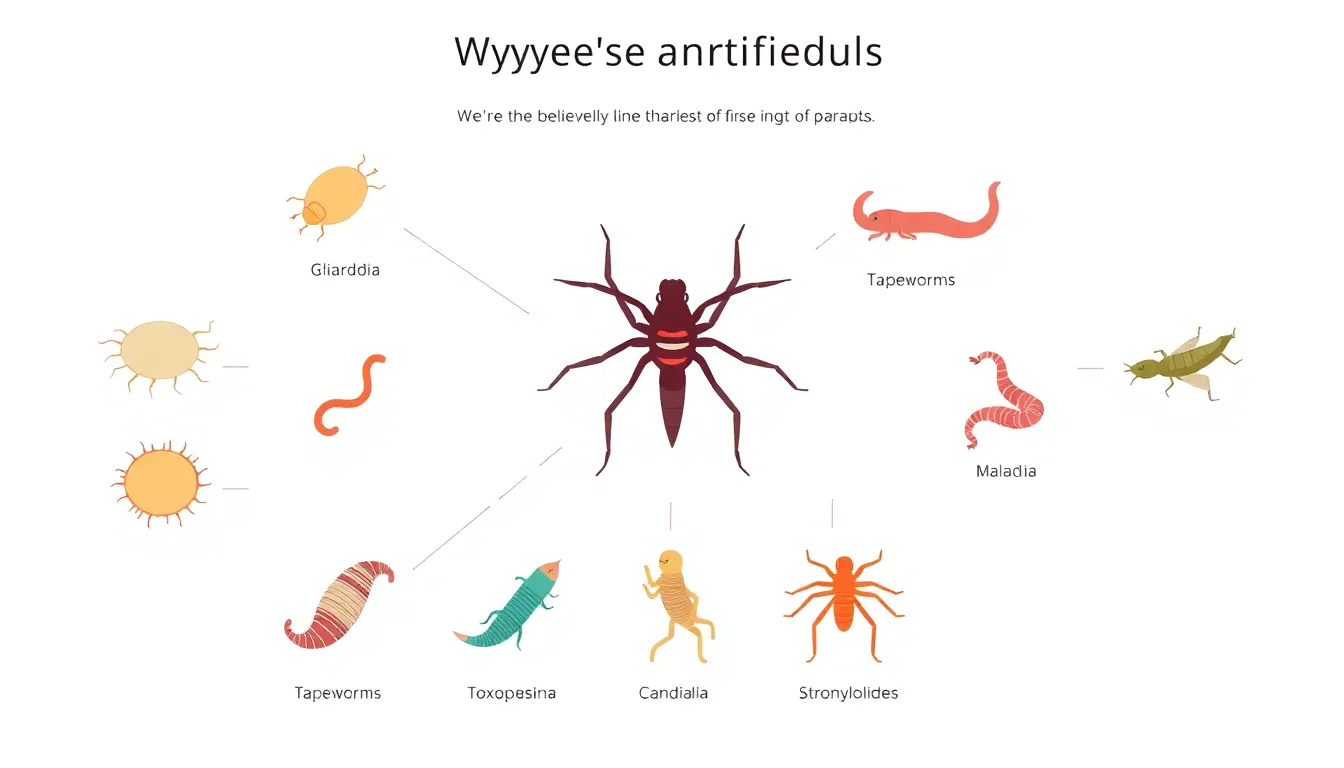Table of Contents
ToggleParasites can wreak havoc on the body, leading to a range of health issues that many adults unknowingly face. While conventional treatments often come with side effects and limitations, an increasing number of people are turning to natural remedies. These alternatives not only aim to eliminate parasites but also support overall wellness, making them an appealing choice for those seeking a holistic approach.
Understanding natural parasite treatments is crucial for anyone looking to reclaim their health. From herbal supplements to dietary changes, various methods exist that harness the power of nature to combat these unwelcome invaders. This article explores effective natural treatments, empowering adults to take charge of their health and find relief without the drawbacks of pharmaceutical options.
Overview of Natural Parasite Treatment for Adults
Natural parasite treatment for adults encompasses various strategies aimed at eliminating or reducing parasitic infections without resorting to conventional pharmaceuticals, which may cause adverse effects. Individuals seeking these alternatives often explore herbal remedies, dietary modifications, and lifestyle adjustments.
Herbal Supplements
Herbal supplements play a pivotal role in natural parasite treatment. Common herbs include:
- Wormwood: Known for its bitter properties, it can help expel parasites from the digestive system.
- Black Walnut: Contains tannins that may assist in killing parasites and promoting digestive health.
- Clove: Exhibits antimicrobial properties and may aid in reducing parasite regeneration.
Dietary Changes
Diet significantly impacts the body’s ability to combat parasites. Key dietary changes include:
- Incorporating Garlic: Garlic has antimicrobial effects, making it beneficial in fighting parasites.
- Consuming Pumpkin Seeds: These seeds contain compounds that may immobilize and eliminate parasites.
- Increasing Fiber Intake: High-fiber foods promote healthy digestion and can help remove parasites from the body.
Lifestyle Adjustments
Adopting specific lifestyle habits contributes to effective parasite treatment. Helpful adjustments include:
- Maintaining Hygiene: Regular handwashing and food safety practices reduce the risk of infection.
- Staying Hydrated: Adequate water intake supports detoxification and overall health.
- Limiting Sugar Intake: Reducing sugar can help create an unfavorable environment for parasites.
Natural parasite treatments often require patience and consistency. Collaborating with healthcare professionals knowledgeable about these remedies ensures a well-informed approach.
Types of Parasites That Affect Adults

Understanding the types of parasites that affect adults is crucial for effective treatment. These parasites can disrupt overall health and lead to various symptoms.
Common Intestinal Parasites
- Giardia: Giardia lamblia causes giardiasis, leading to diarrhea, gas, and stomach cramps. It spreads through contaminated water and food.
- Entamoeba histolytica: This parasite causes amoebic dysentery, resulting in severe diarrhea and abdominal pain. It often transmits through contaminated food and water sources.
- Ascaris: Ascaris lumbricoides is a type of roundworm that can cause intestinal blockage and malnutrition. It spreads through ingesting contaminated soil or food.
- Hookworms: Hookworms, such as Ancylostoma duodenale, attach to the intestinal wall, causing anemia and protein deficiency. They typically enter the body through the skin in contaminated environments.
- Tapeworms: Various species, including Taenia saginata, infect the intestines, leading to weight loss and digestive issues. Transmission occurs through undercooked or contaminated meat.
Systemic and Other Parasites
- Toxoplasma: Toxoplasma gondii can lead to flu-like symptoms and complications for individuals with compromised immune systems. This parasite transmits through undercooked meat or cat feces.
- Malaria: Caused by Plasmodium species, malaria leads to fever, chills, and flu-like symptoms. Mosquito bites transmit this systemic parasite.
- Leishmania: Leishmania species cause cutaneous and visceral leishmaniasis, leading to skin lesions and systemic illness. Sandfly bites transmit this parasite primarily in tropical regions.
- Strongyloides: Strongyloides stercoralis can lead to gastrointestinal and respiratory symptoms. It commonly spreads through soil contaminated with larvae.
- Candida: While often considered a fungus, Candida overgrowth can behave parasitically, causing digestive and immune issues. It often results from antibiotic use, leading to dysbiosis.
Identifying these parasites helps in selecting appropriate natural treatment strategies.
Natural Remedies for Parasite Treatment
Natural remedies for parasite treatment offer effective alternatives that can help restore health without the side effects of conventional medications. The following sections detail specific herbal treatments and dietary changes that support the elimination of parasites.
Herbal Treatments
Herbal treatments play a vital role in combating parasites. Key herbs include:
- Wormwood: Known for its active ingredient, artemisinin, wormwood targets various parasites and supports digestive health.
- Black Walnut: The hull contains juglone, which may disrupt parasite life cycles, aiding in their elimination.
- Clove: Cloves harbor eugenol, which can reduce parasite reproduction and minimize their impact on the body.
- Oregano Oil: Oregano oil possesses antimicrobial properties, which can effectively fight intestinal parasites.
These herbs can be taken in capsule form or brewed as teas. It’s essential to follow proper dosing guidelines and consult healthcare professionals for personalized recommendations.
Dietary Changes
Dietary changes enhance the body’s resilience against parasites. Key recommendations include:
- Garlic: Garlic boosts the immune system and has natural antiparasitic properties due to its active compounds.
- Pumpkin Seeds: These seeds contain compounds that paralyze parasites, facilitating their expulsion.
- Fiber-Rich Foods: Foods high in fiber, such as vegetables and whole grains, improve gut health and create an environment that’s less hospitable to parasites.
- Fermented Foods: Probiotics from foods like yogurt and sauerkraut can restore gut flora, promoting healthy digestion and strengthening immunity.
Incorporating these foods into daily meals supports the body’s natural ability to combat parasitic infections.
Benefits of Natural Treatments
Natural treatments for parasite infections offer several advantages that appeal to many adults seeking alternatives to pharmaceuticals.
- Minimal Side Effects
Natural remedies typically have fewer side effects compared to conventional medications. Herbal supplements like wormwood and black walnut often do not cause the gastrointestinal disturbances common with some pharmaceuticals.
- Holistic Approach
Natural treatments consider the overall wellbeing of the individual, not just the infection. Dietary changes, such as increasing fiber intake and consuming garlic, improve digestive health while addressing parasitic infections.
- Enhanced Immune Support
Many natural treatments strengthen the immune system, making it more resilient against future infections. Ingredients like pumpkin seeds and oregano oil support immune function and help the body naturally combat parasites.
- Accessibility
Natural remedies—such as herbal supplements and dietary modifications—are generally easy to obtain. Many of these ingredients are found in local grocery stores or health food shops, making them widely accessible.
- Customization
Natural treatments allow for personalized approaches to health. Individuals can customize their regimen based on unique health needs, preferences, and sensitivities, ensuring a tailored experience.
- Chronic Condition Management
For individuals with recurrent parasitic infections, natural treatments provide ongoing management strategies. Lifestyle adjustments, including proper hygiene and hydration, serve as continual protective measures.
- Sustainable Practices
Natural remedies often incorporate sustainable practices that promote environmental health. Many herbal treatments are derived from plants that can be cultivated without extensive chemical use.
These benefits highlight the appeal of natural treatments for adults addressing parasitic infections. They encourage individuals to explore these options while maintaining an informed and cautious approach under the guidance of healthcare professionals.
Potential Risks and Considerations
Natural parasite treatments, while appealing for their holistic approach, come with potential risks and important considerations. Users should remain aware of the following factors:
- Lack of Regulation: Natural supplements and remedies lack stringent regulation. Quality and potency can vary significantly among products, leading to ineffective treatment or adverse reactions.
- Allergic Reactions: Some individuals might experience allergic reactions to specific herbs or ingredients, such as wormwood or clove. Testing any new supplement on a small scale before full implementation is prudent.
- Interactions with Medications: Natural treatments can interact with prescription medications, altering their efficacy or increasing side effects. Consulting healthcare professionals before starting any natural regimen is crucial.
- Incomplete Elimination of Parasites: Some natural methods may not fully eradicate parasites, potentially leading to recurring infections. Regular monitoring and follow-up with a healthcare provider can help address ongoing concerns.
- Underlying Health Issues: Certain health conditions may complicate treatment. Individuals with immunocompromised states or underlying illnesses should proceed with caution and seek medical advice.
- Dosage and Duration: Determining the appropriate dosage and duration of natural treatments can be challenging. Adhering to guidelines from qualified practitioners ensures safety and effectiveness.
- Limited Scientific Evidence: While many natural remedies show promise, scientific backing may be limited. More research is necessary to establish definitive efficacy for various natural treatments.
- Potential for Overuse: Overusing natural remedies can lead to toxicity or other health issues. Adhering to recommended dosages enhances safety and minimizes risks.
By understanding these potential risks and considerations, individuals can make informed decisions regarding natural parasite treatments in collaboration with knowledgeable healthcare professionals.
Natural parasite treatments offer a promising alternative for adults seeking to address parasitic infections without the side effects associated with conventional medications. By incorporating herbal supplements and making thoughtful dietary changes, individuals can enhance their body’s ability to combat these unwanted invaders.
It’s essential to approach these remedies with patience and consistency while maintaining open communication with healthcare professionals. Understanding the specific types of parasites and their effects on health can further empower individuals in their treatment journey.
With the right knowledge and guidance, adults can reclaim their health and embrace a holistic approach to wellness that prioritizes natural solutions.






